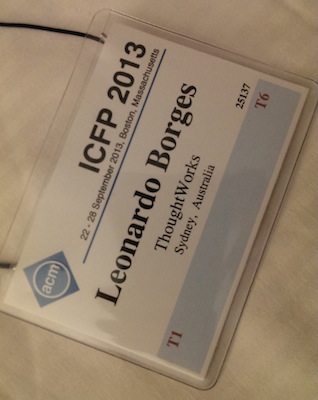Below you will find pages that utilize the taxonomy term “Haskell”
CUFP/ICFP 2013
I’m sitting in the Lobby of the Hilton in Boston and since my flight back to Australia isn’t for a few hours I thought I’d write my experience report while everything is still fresh in my mind.

CUFP - Commercial Users of Functional Programming - is a Workshop-like conference targeting the practically-minded functional programming community.
As it’s stated on their website, “The CUFP workshop is a place where people can see how others are using functional programming to solve real world problems […]”.
clojure and why calculating is better than scheming
Last week while attending Clojure/West in Portland I came across a paper called Why calculating is better than scheming. In a nutshell, this paper is a critique to Abelson and Sussman’s classic textbook SICP - Structure and Interpretation of Computer Programs, used by MIT for many years to teach their introductory programming course.
If you haven’t read SICP, you should. It’s an amazing book. It uses Scheme, a dialect of Lisp, as the vehicle to present fundamental programming concepts.
Monads in small bites - Part IV - Monads
This is Part IV of my Monads tutorial. Make sure you read the previous parts:
-
Part IV - Monads (this post)
A quick recap
In Part I we learned about Functors, which are things that can be mapped over using a normal function - fmap is used for that.
Part II tought us that when our Functors themselves contain functions and we want them applied to the values contained in other Functors, Applicatives come to the rescue - and bring theirs friends pure and <*>.
Monads in small bites - Part III - Monoids
This is Part III of my Monads tutorial. Make sure you read the previous parts:
-
Part III - Monoids (this post)
Monoids
Simply put, Monoids describe types containing a binary function and an identity value.
When applied to the identity value and a random value x, said function leaves its argument x untouched, returning it as a result.
Monads in small bites - Part II - Applicative Functors
This is Part II of my Monads tutorial. Make sure you read the previous parts:
-
Part II - Applicative Functors (this post)
Applicative Functors
In Part I I talked a little about Haskell type signatures and introduced Functors, which provide a way to map standard functions over values which are wrapped inside a Functor - we used fmap for that. You might want to skim through it again as a refresher.
Monads in small bites - Part I - Functors
Today I join the already bloated group of people who wrote monad tutorials. It’s a bit of a ritual, really.
Different than most tutorials though I aim to take a different approach. The good news is that I won’t be comparing monads to burritos :)
People say one needs to have his/her own epiphany in order to understand Monads and reading explanations from others is of little help. My goal is to disprove that.